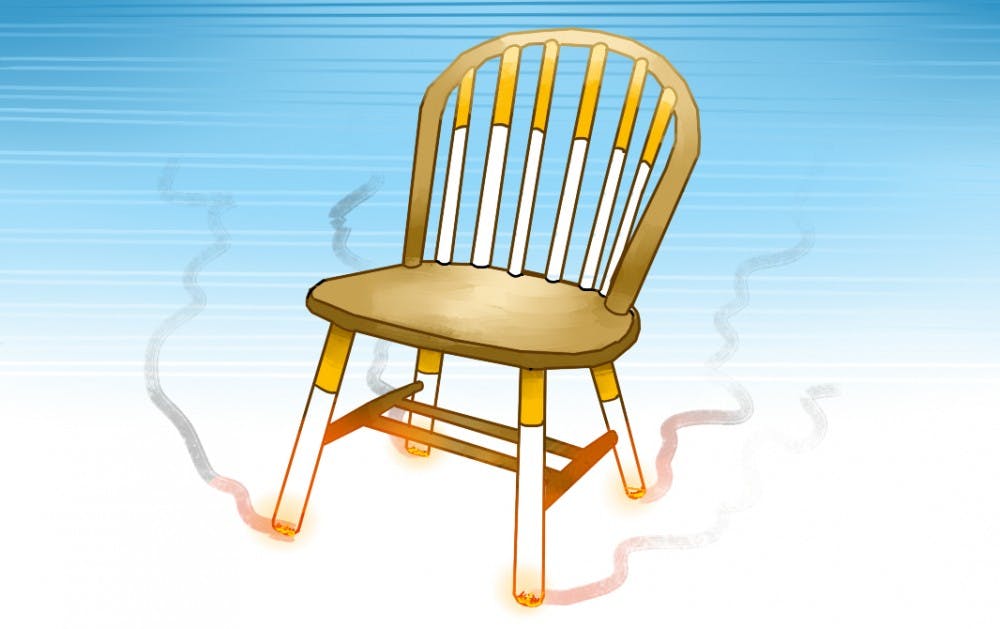You might want to sit down for this one.
Though the smell of cigarette smoke may not linger on campus due to ASU's tobacco-free policy, rumors circulate on whether another common habit of college students similarly impacts their health.
An ASU professor worked as part of a team researching whether the health effects of sitting are equal to that of smoking and how media contributed to the validity of the popular myth that sitting is the new smoking.
However, a study has proved smoking is in fact, worse.
Associate professor in the College of Health Solutions, Matthew Buman, and his colleagues published a peer-reviewed paper in the American Journal of Public Health that sheds light on the burning question.
The researchers examined whether sitting or smoking could result in more health problems by analyzing and comparing multiple large-scale research studies on the various health risks and long-term effects of sitting versus smoking. These studies that were analyzed sampled a broad variety of adults and surveyed their health over long periods of time.
Jeff Vallance, the lead author of the paper, said his team quantified the resulting data on the negative effects of each habit, leading to the conclusion that the repercussions of smoking regularly are three times worse than the effects of prolonged sitting.
The study stated that "the strongest risk estimates (for prolonged sitting) have been observed for type 2 diabetes."
"The knowledge that sitting can be harmful for our health has been around for the last 15 years." Buman said. "Smoking is something you can abstain from, but you can't abstain from sitting. The problem isn't sitting itself, but prolonged sitting."
Vallance said it doesn't make sense for the media to compare sitting to smoking as a scare tactic, since the general public is informed by the media and depends on it for reliable information.
“It is hard to compare something that is habit to an addiction. Also, secondhand smoke harms people compared to sitting, which can’t harm anyone,” Vallance said.
Results also show that smoking has a strong link to lung cancer, where sitting does not directly lead to cancer, according to Buman.
"The public gets messages around health that can sometimes be misleading, and we want to avoid that if possible," Buman said.
Media outlets that sensationalized the idea of sitting being the new smoking include the LA Times, Bloomberg, the New York Post, Huffington Post, CNN and Forbes.
James Levine, president of Fondation IPSEN in France, formerly worked in the endocrinology division at Mayo Clinic Arizona and with the Mayo Clinic/ASU Obesity Solutions Initiative.
Levine created the concept of the treadmill desk invention during his time at the Mayo Clinic/ASU with a goal of building a more active society.
"Data in the lab showed that people who do not exercise were more likely to have diabetes, heart disease and more health issues," Levine said.
Despite the press making headlines with claims such as "sitting is the new smoking," Levine believes the publicity is good for the public's awareness, despite the comparison of health effects.
"When someone says sitting is the new smoking, I don't think they are saying one is better or worse," Levine said. "They both need attention, and I think it's a good thing the press would even debate such a matter and bring health to the public's attention."
Lelan Lawrence, a freshman majoring in psychology, smokes cigarettes despite his awareness of the health hazards.
Lawrence has been smoking cigarettes for over two years now. He said a friend of his got him into smoking, but his parents have also smoked since he was a child.
"I can remember the (smell) of Parliament menthol in the car when I was a little kid," Lawrence said.
He said he typically buys a pack of cigarettes every two weeks and usually smokes them socially with his friends. Lawrence also uses a JUUL regularly, but said he was not worried about health concerns at this moment. In the past, he temporarily quit smoking for financial reasons.
"I've had no problem quitting smoking, so I'm not too worried about addiction," Lawrence said.
If a student gets caught smoking on campus at ASU, they are given a written warning for the first offense, and a $50 fine and referral for the second and third offenses.
Lawrence said this policy does not deter his habit, and if he needs a smoke break while on campus, he'll walk five to 10 minutes off campus to smoke.
According to the 2018 American College Health Association National College Health Assessment, 79.5 percent of students reported never having smoked a cigarette.
Rita Wermers, a nurse practitioner and advanced nursing practice graduate student, has been working for over five years with ASU Health Services, caring for students, faculty and staff.
"Common problems from smoking include more frequent upper respiratory infections," Wermers said. "Younger students are more at risk for these infections when they inhale tobacco products whether that is vaping, or smoking cigars or cigarettes."
The natural defense functions in your body temporarily don't work while smoking, Wermers said. This makes smokers more susceptible to bouts of the flu and other health issues.
However, Wermers said the negative effects of sitting for long periods of time should not be discounted despite smoking resulting in stronger consequences.
"Sitting weakens your muscles, including your heart, which can cause heart disease," Wermers said. "In addition, people who often sit for long periods of time have upper and lower back pain and risk obesity, which opens up a path to many other problems like diabetes and high blood pressure."
Overall, Wermers said students should pursue activities that contribute positively to their overall health and avoid ones which have health consequences.
Any ASU students who are interested in quitting smoking can find resources and information here.
Reach the reporter at mdhunte2@asu.edu or follow @masaihuntertv on Twitter.
Like The State Press on Facebook and follow @statepress on Twitter.




